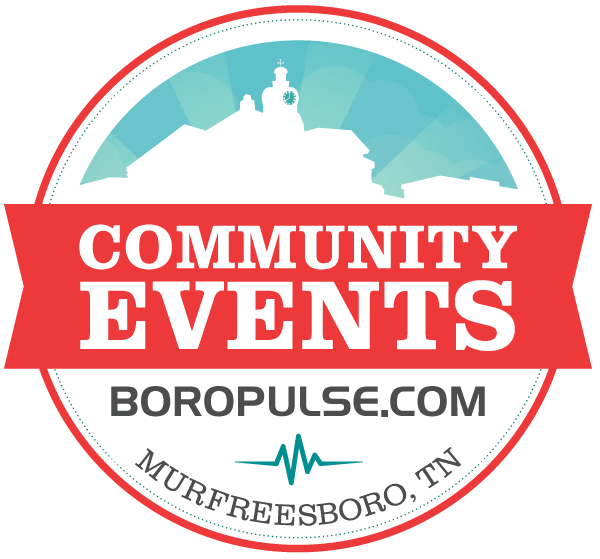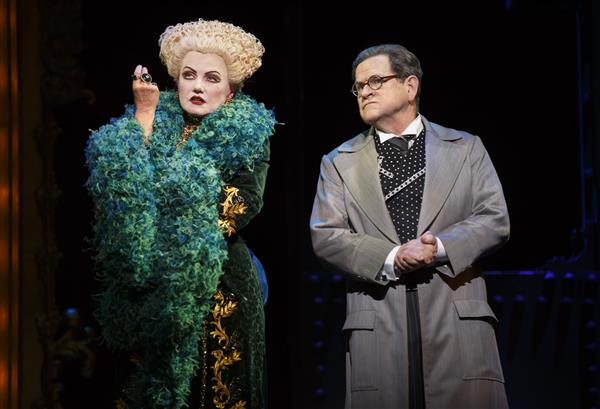
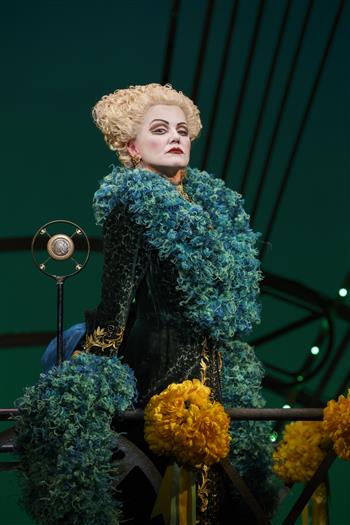
(Top) Alison Fraser, with Tim Kazurinsky. (Photos by Joan Marcus)
Playing the bad guy means playing one of the most significant roles to the audience. The bad guy is the reason all of the other characters have something to do. Their very presence creates drama, theme and action to be observed by the audience, not to mention an often fun and despicable character that people love to hate. In Music City to play the villain is two-time Tony Award nominee Alison Fraser, whose role as Wicked’s Madame Morrible is something sure to bewitch audiences.
Murfreesboro Pulse: While staying in Nashville, what are you plans during the tour?
Fraser: Oh Gosh! Well, the interesting thing is, while I’m on tour with Wicked, I’m releasing an album on April 8. My new album Tennessee Williams: Words and Music is dropping on the Ghostlight Label, which is a wonderful label that deals with a lot of cast albums. It’s a really wonderful recording of a show I did of music that Tennessee Williams included in his plays along with the text of his plays. Last year when we were in New Orleans, we decided with the recording capabilities we had down there and wonderful musicians that we had that we would put it on disc. And I’m very honored to be in Music City. Of course, I want to go to the Grand Ole Opry. One of my specialties is I love office buildings. I love good looking office buildings. I’ll be sure to go around with my camera. I also very much like historical homes. Basically, what I like to do is to not stop walking until I have to go to the theater.
Nashville has a lot of great homes and architecture. Vanderbilt has a lovely campus, not to mention, if you’re looking for interesting offices, Nashville skyline includes “The Batman Building.” It’s the AT&T tower, which you’ll know by the name when you see it.
Batman Building? Awesome.
Let’s talk about your involvement with the Wicked production. From an actor’s perspective, how is it different from the other Broadway productions you’ve done in the past?
It’s hugely, hugely popular. The other Broadway shows that I’ve done . . . did you know The Secret Garden, in retrospect, is now as such an iconic piece of theater, but at the time we had a little bit of trouble putting bodies in the seats. Of course my first leading role on Broadway was in Romance, Romance which was a very small budgeted show. And even though it did run for 11 months, it always struggled to get people in the seats. The Mystery of Edwin Drood, my first Broadway show, closed early. I think it just made it to a year or something like that. The Secret Garden did not last as long as it should have. I think it lasted a year and a half. It should have run much longer, as I think it has one of the finest scores of any musical in the past 20 years. Even Gypsy did not last as long as I thought it was going to last. So Wicked is the first unequivocal hit that I have been in. You do not see empty seats. It’s very difficult to get tickets. I could not get tickets to the people I need to get in unless I had a connection to the company manager (laughs). Wicked is an event piece of theater. It’s such a wildly popular show that it’s a luxury to me as an actress to know that there’s going to be a hugely appreciative audience out there and the house is going to be filled every night. I think it attributes to the masterwork that is this piece of theater that it’s a fantastic story that resonates not only with younger people, but audiences across the board. We had in Cincinnati a fellow, this marvelous man who was the head of the zoo. He was middle-aged; probably in his late forties. And he had seen the show 30 times. We’re not talking about a theater-obsessed 20-year-old. We’re talking about this master zookeeper who runs one of the best zoos in the world, and something has resonated win him that he feels the need to keep him coming back. For me it’s such a thrill that people keep coming back. I’ve seen it 10 times, and I cry every time. It’s a wonderful, huge hit because it’s a great show that has something to say to everybody.
So the popularity of the show is due to its longevity? It seems like the other shows you mention don’t have the built-in mechanism of being attached to this classic film.
Everybody loves The Wizard of Oz, but this is so completely different. Of course it was based on Gregory Maguire’s alternate view of Oz in the book, which basically explored the backstory of Glinda and Elphaba. And I just learned something fun. Do you know where the name “Elphaba” comes from? L. Frank Baum. Isn’t that wild? I love that. I also know where “Oz” comes from. L. Frank Baum was looking at a filing cabinet, and you know how filing cabinets have “A-C”? He saw a filing cabinet that said “O-Z” and he thought “That’s the name of my land.”
Let’s ask, in playing the role of “Madame Morrible,” tell us who this character is both in the context of the play and in the real world to you?
In the real world? Um, I don’t know how political I can get here, but I regard Madame Morrible as the Cheney to the Wizard’s Bush. I think that she is the power behind the throne. Once she grabs the power she has been lusting after her entire life, she runs with it. And she actually goes a little power mad. I think that absolutely power corrupts absolutely. I guess if you’re going to consider that there’s a villain in this, it’s me. Madame Morrible turns into a truly wicked character. And what I like to explore is that if you have a character who has done “not-such-nice” things, you have to look at the world through their perspective. I think that every villain is the hero of his own piece. The villains that we think of don’t think of themselves as villains. Hitler didn’t think of himself as a villain. He thought he was doing the right thing. But they’re the heroes of their own story. So that’s how I like to approach this. And when I was handed this fantastic part, I said “How can I justify what I do in this play? Basically, how can I feel good about myself? How can I like my character, despite the despicable things that she does?” And here’s a woman who is very, very intelligent, who has seemingly hit a glass ceiling. She was the head mistress of a university but was going no further until this opportunity availed itself for her to go to the Emerald City and become a part of the power of the system of the land. She becomes close to the Wizard and manipulates situations for him. She is the press secretary for Glinda. She is the one that basically brands Elphaba as a wicked witch. She’s the propaganda machine of Oz. She’s the second brightest person on that stage.
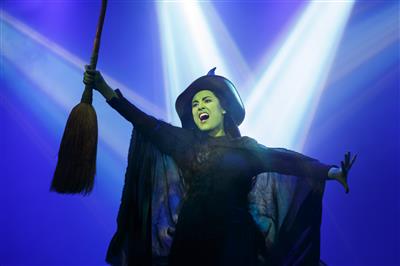
Alison Luff as Elphaba
So she’s a “villain’s villain” in a way?
She’s the perceived “villain’s villain.” I would say that the protagonist is Elphaba, a women we have always thought of as being “wicked.” In a world in which we tend to see things as black and white, “wicked” and “good” are quite gray. Good people have wicked sides to them. Wicked people have good sides to them. Maybe wicked is good. Maybe good is wicked. I think it’s a very interesting thing to explore. Perhaps our perceptions are not as keen as we think they are. Perhaps it’s not a good idea to judge a book by its cover. Just because Madame Morrible says the Wicked Witch is indeed wicked. And it’s not true. Maybe we should make our own informed decisions after making the facts available to us. So I think that’s a very important lesson: Who is the bad guy? Well let me decide for myself. Don’t tell me who the bad guy is. Earlier I regarded Morrible as Cheney to the Wizard’s “Bush.” Some people reading this article might be Bush fans. Some might like Cheney.
When interpreting a character from a book or a pre-existent Broadyway run as loved as Wicked, how do you differentiate between previous portrayals?
Of course, I had seen the show a couple of times before. I saw it 10 years ago, and when I was deciding whether or not I wanted to do it. And then I said “Oh my God, I have to!” But I was looking at the character, listening to the words, and thinking about how I would interpret it. For me, I go back to the text. I say “What do Winnie Holzman’s intensely intelligent words say?” This is really a fantastically written book. I’ve done a lot of musicals, and this is one of the best books to a musical I have ever experienced. I also think that Stephen Schwartz’s score is terrific. I look at those lyrics. I teach a course at Fordham [University] and my course is “Song as Scene,” which is all about the text being intrinsic to really understanding what that song is about. That’s what I do. I don’t really think about other people doing the part. These clothes look different on me. This makeup looks different on me. I think about doing the most authentic character that I am capable of doing. I do that by carefully studying the words. I approach it as if I’m creating it. I have to do that. It has to be me. If it’s not me, it’s not authentic.
When I was working with Arthur Laurents on Gypsy, the most important thing for Arthur was “authenticity.” And even though in Wicked we live in a fantastical world, we still have to be authentic within the parameters of that world. That’s not to say it can’t be fun, or grand, but it has to stem from truth. We would go back to the table every three weeks when we were doing Gypsy. And to sit at that table and listen to Arthur explicate text that he had written 40 years ago, 50 years ago, whatever. It was just a huge privilege to be in the room gleaning this knowledge.
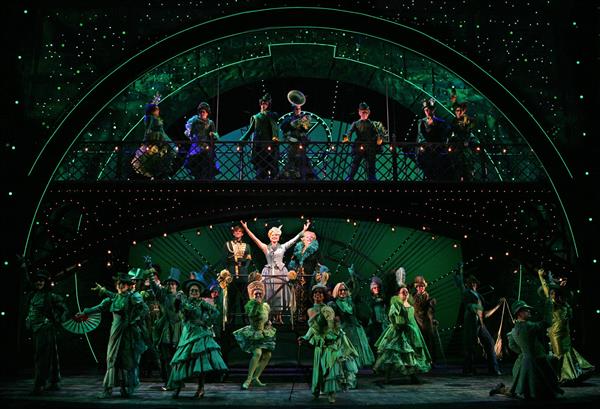
This seems to be a perfect storm of great elements. You’ve got an intelligent book that was handed over to very capable people that produced great actors, great music . . .
And very much so the set designers. This is such an evocative world. You just look up at that Time Dragon and go “Wow!” All those gears, and the lighting. And you’re absolutely right. It’s a perfect storm of talent that I think makes for a perfect night of theater. I am so hard on musical theater. I do not like mediocre musicals. I would rather not go to the theater than see something that I was yawning at. I’m notoriously picky when it comes to what I like in musicals, and it would very much surprise you at some of the things I don’t like, which I’m not going to mention. There are some composers I’m not particularly in awe of, despite the fact that the world is. I have enormous respect for Stephen Schwartz. You listen to the girls singing “Defying Gravity” and “Thank Goodness” and “Popular” . . . I have been changed for good. I am waiting in the wings, waiting to go on, listening to those songs, and a tear wells up in me. It really does make you think “Who came into my life to help me become a better person?” If a lyricist, if a song writer can make some jaded ole’ actress sitting in the wings think about serious stuff like that, that’s major. The whole point of art is to have universal appeal, at least for me.
When you’re looking at the painting, you’re not just looking at what is in the painting. You’re thinking about what it evokes. If Stephen Schwartz can evoke feelings in me, if it makes it applicable to feelings in my life, that’s high praise. He makes the human condition applicable to individuals. I think that’s incredible.
Without giving anything away, do you have any favorite moments from working in this production, or the play itself?
I love the opening of Act II. I feel like what I do at the beginning is honest. To me, that’s where Morrible is doing her best work. I’m not talking about the actress playing Morrible, I’m talking about the character. In “Thank Goodness,” what you see is a very intelligent woman doing her job very, very well. A powerful woman doing her job well. That’s a feminist statement right there.
~~~
Wicked plays at TPAC’s Andrew Jackson Hall through April 20; for tickets, visit tpac.org.






